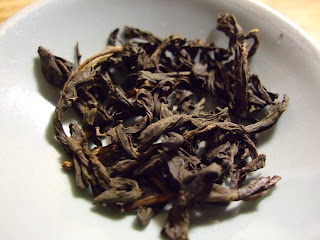This time I decided to sample some Ming Cong from TeaCuppa. I was intrigued because it's not one of the Si Da Ming Cha, or the four "best-known" varieties of Wuyi (Da Hong Pao, Tie Luo Han, Shui Jin Gui, and Bai Ji Guan). According to the description it's not seen as often on the tea market, so I'm a bit interested in seeing why that is.
 The dry leaves has a slight aroma of dark chocolate, punctuated by spiciness. In the liquor, the fruitiness lingers in this tea, and it's not upfront about it like other Wuyi I've sampled, like Shui Xian. Because the fruitiness lingers, the tea has a very smooth finish to it. An interesting fact, after drining some tea and than some water the water tastes sweet. I wonder why that is (suggestions, people?). There are a lot of complex tones in the tea's flavor, and there is a subtle tartness that follows along with the fruitiness. By the third steeping, however, the fruitiness mellows out almost completely. Overall, I find this tea to a bit tamer or milder when compared to Shui Xian.
The dry leaves has a slight aroma of dark chocolate, punctuated by spiciness. In the liquor, the fruitiness lingers in this tea, and it's not upfront about it like other Wuyi I've sampled, like Shui Xian. Because the fruitiness lingers, the tea has a very smooth finish to it. An interesting fact, after drining some tea and than some water the water tastes sweet. I wonder why that is (suggestions, people?). There are a lot of complex tones in the tea's flavor, and there is a subtle tartness that follows along with the fruitiness. By the third steeping, however, the fruitiness mellows out almost completely. Overall, I find this tea to a bit tamer or milder when compared to Shui Xian.Concluding Thoughts
As I review more teas, I'm beginning to notice a trend here. I never really disparge any one tea here, and I seem to like all the teas I taste. To me, I feel that this is a both a good thing and a bad thing. It's bad because I'm too forgiving to certain aspects of a tea that might take away from its merit. But I also think it's a good thing because I certainly do not want to be a super critic, where no tea is good enough for me. I think that tea is a personal experience, and it's up to the individual taster to decide which tea is better. For instance, the list of the top 10 Chinese teas is completely absurd. Trying to compare TGY to DHP is like comparing apples to oranges. Okay, sure, TGY might win in terms of better aroma, or DHP can beat TGY in terms of fruitiness, but you can't really quantitatively compare the two. It just doesn't work. Thoughts, readers?







